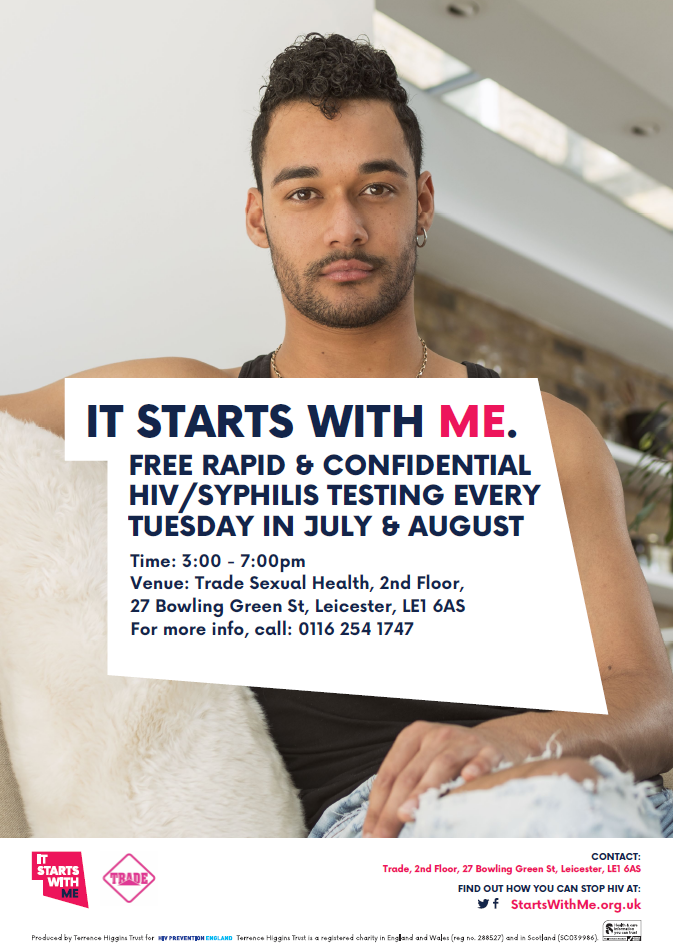Thursday, 20th July 2017
Over July and August, Trade are offering rapid HIV and Syphilis tests to gay and bisexual men, and other men who have sex with men (MSM) across Leicester, Leicestershire & Rutland.
You may have heard a lot about HIV and our Kwik Prick rapid HIV testing service that we offer, but Syphilis is on the rise not just in Leicester, but across the England. We want you to get clued up and tested for it and get your results in a matter of minutes. So in order to get yourself clued up on Syphilis, check out all of the details below and come and test with Trade for HIV and Syphilis every Tuesday between 3-7pm throughout July and August.
What is it?
Syphilis is a bacterial infection that is passed on through either having sexual contact with a person who has a syphilis sore (ulcer) or through unsafe injecting practices.
How is Syphilis passed on?
You can catch syphilis by direct contact with a syphilis sore or “chancre” (commonly a more or less distinct ulcer or sore with a hard base) through anal sex, vaginal sex, oral sex, rimming and fisting. Using condoms and gloves reduces the risk of transmission, but does not eliminate it, as they may not cover the sore.
You can also catch syphilis via blood, such as sharing needles or equipment when injecting drugs.
How do you prevent yourself from getting it?
You can significantly reduce your risk of catching syphilis by using condoms and water or silicone based lube for sex, dental dams for rimming and gloves for fisting. It is best not to share sex toys and clean them thoroughly after every use.
What are the symptoms of syphilis?
The symptoms of syphilis occur in three stages:
-
Primary syphilis infection; will often present about 3 to 4 weeks after someone has been infected with the bacteria and individuals may develop a painless sore, ulcer or rash on the genitals, rectum or inside the mouth, which people can fail to notice straight away. The sore, ulcer or rash lasts between 2 to 6 weeks before disappearing. If somebody else comes into close contact with the sore or ulcer, typically during sex, they can also become infected.
-
Secondary stage; causes fever, headaches, sore throat and night sweats (among others). You can also get warts in your genital area.
-
Latent and late stage syphilis; usually happens ten years or more following infection. It is rare to see people with third stage syphilis these days because the infection is usually caught early enough for treatment. In this stage, untreated syphilis can cause serious damage to your body.
You are only infectious to other people in the first and second stages of syphilis.
What do you do if you think you have it?
If you have had any of the symptoms of syphilis (especially the painless sores or ulcers) then you should go straight to the Sexual Health Clinic at St Peter's Health Centre in Leicester or Loughborough Health Centre.
They will take a swab test from the ulcer if you have one, or take a blood sample to detect antibodies to syphilis. They will also offer tests for other infections such as chlamydia, gonorrhoea and HIV. If you are found to have syphilis, it is easily treated with antibiotics, usually as an injection.
It is possible to become infected with syphilis without getting any symptoms, or not really noticing the symptoms. It is therefore recommended that you have a check up with each new sexual partner, or if you have multiple partners, every three months. If you haven't got any symptoms, then test with Trade over July and August (see times below).


